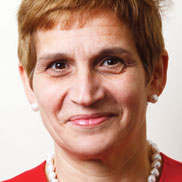It would have been easy for Professor Clare Gerada to settle back into her London practice and take a rest from medical politics, but it was always an unlikely scenario.
After reinventing the role of RCGP chair as a populist defender of the profession, Professor Gerada has moved onto what could have been her most controversial role to date – leading primary care reform in London for NHS England.
One of our panel said that Professor Gerada was leading modernisation in the capital ‘with great effect’. And although it is early days, a paper she co-authored last year shows the direction of travel – perhaps unsurprisingly including a shift in resources from secondary to primary care, the potential end of enhanced services and practices joining federations to improve access for patients.
And despite being within the clutches of the great NHS behemoth, Professor Gerada has – true to previous form – continued to speak her mind. She loudly supported the care.data scheme, suggested that GPs should be paid per 1,000 consultations and accused NHS chiefs of an ‘emperor’s new clothes’ optimism about the challenges facing the NHS.
She also still heads up the Practitioner Health Programme in London a confidential service for doctors living in London who have mental health or addiction concerns.
Speaking to Pulse, she jokes she’s quite proud to have survived the loss of the RCGP chair position last November. But that more seriously the year has been ‘about getting back into mainstream general practice, realising I love it and realising how fantastic my colleagues are to do this every day’.
But there have been setbacks. Professor Gerada put herself up for election to BMA Council – promising to make medicine ‘fun – but had to withdraw as it would conflict with her NHS England role. She left the college with the cloud of the legal challenge from international doctors over the MRCGP exam still unresolved and her call for GPs to consider renouncing their independent contractor status was largely ignored.
But her considerable influence remains. The campaigning style she pioneered at the RCGP to ensure that general practice is given more resources is still going strong.
She was placed on the Sunday Times list of the 500 most influential Britons this year and remains one of the most popular and strongest voices both within the profession and outside today. One thing is certain; we will hear a lot more Professor Gerada over the next year.
Related links
Leading the RCGP was a great honour
From seeing patients to transforming primary care
Pulse October survey
Take our July 2025 survey to potentially win £1.000 worth of tokens















